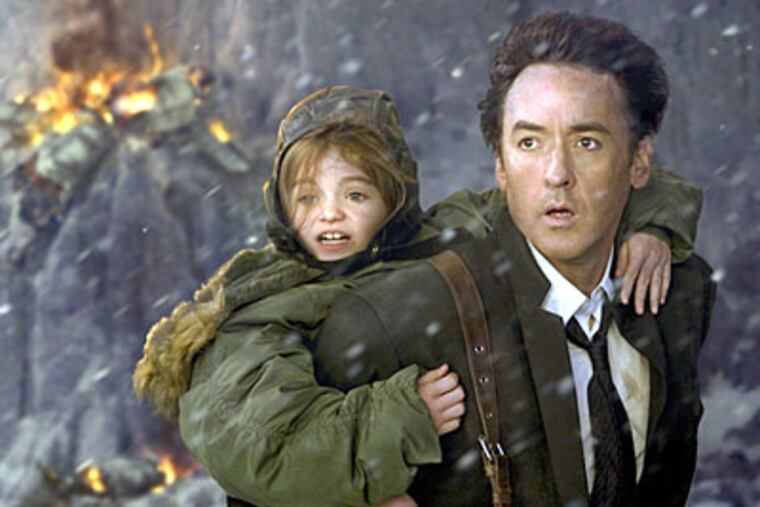'Master of Disaster' does it again
Roland Emmerich's latest big-budget doomsday extravaganza is his "darkest film" to date.

CANCUN, Mexico - Roland Emmerich has an ongoing project: destroying the world. In 1996's Independence Day, the German director sent aliens to wipe out the White House. In 1998, he unleashed Godzilla to wreak havoc on the streets of New York. In 2004's The Day After Tomorrow, he froze the planet in a new ice age.
But in his new film, 2012, to be released Nov. 13 and already the eye of a vast promotion storm, things get really bad. Emmerich, who has earned the unofficial title of "Master of Disaster," admits having searched Google for a doomsday scenario even more spectacular than his previous destructions of Earth. He came up with the Mayan calendar, which abruptly expires Dec. 21, 2012 - the end of the world, some theorists believe.
Emmerich is not so sure he joins in that belief. "It's a compelling story," he says, grinning, sitting in a Cancun hotel ballroom that Sony Pictures has converted into an indoor jungle. Exotic bird calls twitter from loudspeakers. Pressed further, he replies: "Did I believe in aliens when I made Independence Day?"
The Mayans failed to specify how exactly the apocalypse would look, so Emmerich opted for a collapse of the Earth's crust, giant floods, and hellish rains of fire (yet not enough to kill the main character, played by John Cusack).
At a personal-record budget of at least $200 million, Emmerich deadpans that "I didn't refrain myself this time." As if he had restrained himself in his previous films. Since Independence Day, he has focused on big-budget movies, delivering five blockbusters in a row, each grossing far more than $100 million domestically. Rarely has a Hollywood director had such a track record. But then, rarely has a director so consistently failed to impress critics. The legendary Roger Ebert once even likened Emmerich to Ed Wood, widely considered the worst filmmaker in history.
But Emmerich, who at 53 still looks boyish and speaks in the gentlest of voices, couldn't care less. It doesn't bother him to be known as "Roland the Destroyer," he says. "It bothers my mother, though." He's making movies "for the masses. That's nothing to be ashamed of."
But it was something that used to be ridiculed at the beginning of his career in his native Germany. In the early '80s, other young directors at the renowned University of Television and Film Munich (HFF) looked to Wim Wenders or Rainer Werner Fassbinder for inspiration. Emmerich, who started out as a production designer, turned to Steven Spielberg and George Lucas. "Little Spielberg" became his nickname, and it wasn't meant as a compliment.
At $550,000, his 1984 final film project at HFF, the sci-fi picture The Noah's Ark Principle, was costlier than many German films at the time. Emmerich's father, the owner of a garden-machinery company near Sindelfingen in southern Germany, had to kick in money to save the project.
Emmerich credits this experience with teaching him how to run a production efficiently - a quality that studios and actors alike now appreciate in him.
"He's the most meticulous planner you'll find in the business," says Cusack, "and still very relaxed."
But his talent and passion for screen extravaganzas "wasn't accepted in Germany," Emmerich says. Consequently, he left for the United States. He established his reputation here in 1992, taking over the Jean-Claude Van Damme action vehicle Universal Soldier when original director Andrew Davis quit. Emmerich finished the film, as undistinguished as most of his early work, but on time and on budget.
At least in some respects, Emmerich never became the industry-standard director he appears to be at first glance. "I would like to think of myself as a kind of outsider in Hollywood," he says. And he does things his way. Auctioning off his scripts among studios allows him to maintain creative control. Against contrary advice, he made an African American (Will Smith) and a Jewish man (Jeff Goldblum) the heroes of Independence Day. And The Day After Tomorrow turned out to be a harsh indictment of the Bush administration's climate policies.
In fact, the man who rose to fame as a cinematic escapist is an activist in real life. In Germany, he's a strong supporter of the environmentalist Green Party. He campaigns for gay rights, and he doesn't hide his contempt for organized religion. In 2012, the pope is buried under debris when St. Peter's dome comes tumbling down, and peace-loving Tibetan monks are not spared by the great floods. No Islamic site is seen perishing, though. "We didn't destroy Mecca because we didn't want to have to deal with a fatwa," Emmerich says.
"I really think Roland manages to give these giant blockbusters a personal touch," says Cusack. "There's a dark side to his films."
Emmerich says he couldn't make a patriotic feel-good movie like Independence Day anymore: "These days I have a much more pessimistic outlook for our civilization, despite the good America can do for the world under Barack Obama." For Emmerich, widespread fanaticism and ignorance and denial regarding climate change pose the question of whether humankind is putting the Earth on a path to ultimate extinction.
He calls 2012 his "darkest film" to date. "I packed everything in this movie," he says. "I don't see what could be left for me in the genre." The Master of Disaster has hinted at retiring from his craft before. And indeed his next film, Anonymous, seems a step away from blockbusters: It is to be a rather modest mystery about whether William Shakespeare really wrote all his plays himself.
Yet Emmerich won't say 2012 is definitely the last time he takes the world to the brink of destruction: "Never say never."
As Cusack puts it: "Why would someone stop doing what he's obviously so good at?"